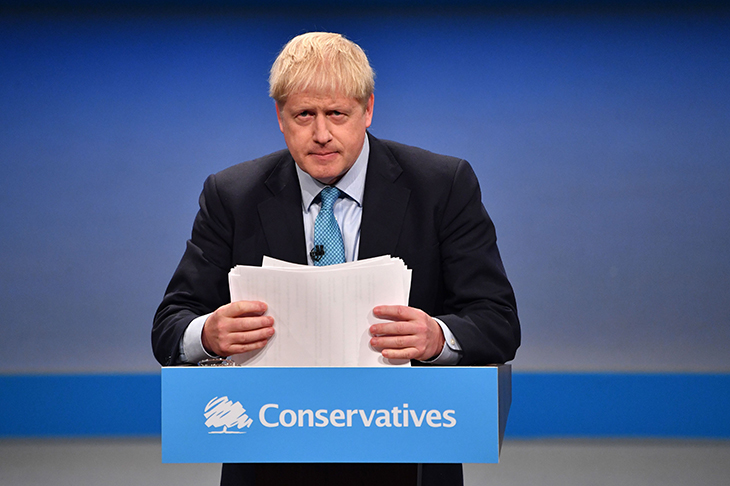Manchester
It could be caused by desperation, but this Tory conference is very jolly. At last there is something to support, and someone. Some might witheringly point out that it was fun on the Titanic until the iceberg got in the way, but I notice two phenomena. The first is confirmation of this column’s long-standing theory that the only job Boris Johnson knows how to do is the top one. He seems simultaneously energised and at ease. The second is that his opponents’ scorn, hatred and disapproval help him. Take allegations of sexual misconduct. In normal times, these might cause trouble, but now the anger with his accusers is such that I honestly think if the Prime Minister were suddenly to attempt to snog Mishal Husain, or even Nick Robinson, in the course of an interview, he would be forgiven. The most active senior Remainers are very clever people, but they do not understand how they are viewed by those who disagree with them. Their mixture of high moral talk about parliamentary sovereignty, legal process and the wickedness of inflammatory speech with unqualified character assassination of Boris makes them look more unscrupulous than people who just trade low blows. They carefully frame an act of parliament so that it insists on surrender to the European Union, but are then outraged when people therefore describe it as the Surrender Act. They themselves called it the European Union (Withdrawal) (No. 2) Act, a far more untrue and provocative name. When they speak of finding a ‘caretaker’ prime minister, of what do they claim to be taking care? The wishes of voters expressed in the referendum? These people are unwitting self-parodists, and conference-goers here love Boris for fighting for their freedom to laugh at them.
Conference-goers also resent the way Labour MPs brandish their death-threat messages as if these were typical Brexit behaviour. The sad truth is that death threats are almost the stock in trade of social media and come from both sides (and on other issues too). Dominic Cummings and his family have received about 15 death threats by letter at home — more sinister than those on social media because they show that the hate-mailers know where they live. Boris himself is under an unprecedented level of threat because he challenges Remain.
The judgment of the Supreme Court last week is obviously by far the greatest victory so far for ‘lawfare’ — the long march of the left to make politics justiciable rather than democratic. But it is also overreach. Belatedly, Conservatives are getting interested in the way our legal system has been perverted and are now talking of a Restoration Bill if they win next time. This would accomplish the return of the full powers of the Lord Chancellor, after Tony Blair casually got rid of the work of 700 years over a weekend. It would downgrade and restrict the Supreme Court, removing, among other things, its grandiose name; and it would reassert the rights of the Crown in Parliament — the doctrine which, for more than three centuries until last week, enabled the government of the country to be carried on.
In the conference exhibition space, I sign copies of the final volume of my biography of Mrs Thatcher (Herself Alone). In the excitingly enormous queue, I come across a young Tory from mainland China and then, about half an hour later, another one. Both are ardent Thatcherites and both are conscious of the date. Our encounters take place on the 70th anniversary of the foundation of the People’s Republic of China, and the related counter-demonstrations in Hong Kong in which a demonstrator is shot. Although she was largely unsuccessful in increasing democratic representation in Hong Kong before the handover, Mrs Thatcher was probably the only leader in the free world who gave serious thought to the issue. She was aware that Hong Kongers, though not citizens of what is normally understood as a nation, had developed a collective identity which made them a free people. She sought to defend them. The concept of ‘One Country, Two Systems’ was supposed to make their freedom viable for the future, but Beijing has now shown that it cannot tolerate this. ‘No force can stop China,’ declared Xi Jinping on Tuesday. I wonder. Seventy years is a long time to hold hundreds of millions of people down, even if, for half that time, you have allowed them to get richer. Seventy years after the Russian Revolution, the Soviet Union still held sway over its empire. Two years later, it dared not stop the Berlin Wall coming down.
‘What would Margaret Thatcher do about Brexit?’ people keep asking me. Why do they think I would know? If I have a ‘USP’ with my book, it is that I tend to know what she did do. I have no more idea than anyone else what she would have done. The speculation is idle, except to the extent that it might make people reflect on the contemporary relevance of what she thought or did. In this respect, her approach to the electoral importance of the idea of a referendum is suggestive. At the end of October 1990, when she had just returned, in a rage, from the Rome Summit which pushed forwards towards Economic and Monetary Union, I attended a reception at 10 Downing Street. Mrs T came up to me and said that she would be happy to fight the next election on Europe: ‘I would say to the voters, “Ask the candidates, ‘Do you want to go to parliament to decide things for me, or do you just want to hand over these decisions to foreign powers?’”’ When she fought the leadership election which Geoffrey Howe’s resignation then provoked, she said in newspaper interviews — one with Simon Jenkins and one with me — that she would call a referendum on Britain’s membership of the single currency. Thus did the idea of a referendum re-enter the political bloodstream. Since then, it has never left it.
Got something to add? Join the discussion and comment below.
Get 10 issues for just $10
Subscribe to The Spectator Australia today for the next 10 magazine issues, plus full online access, for just $10.
You might disagree with half of it, but you’ll enjoy reading all of it. Try your first month for free, then just $2 a week for the remainder of your first year.















Comments
Don't miss out
Join the conversation with other Spectator Australia readers. Subscribe to leave a comment.
SUBSCRIBEAlready a subscriber? Log in